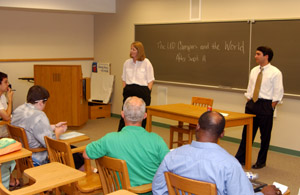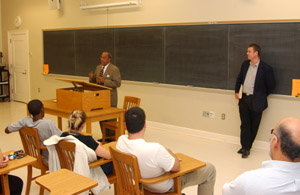|
Sept. 12, 2002--Students, faculty and members of the community gathered Wednesday night after the Candlelight Commemoration in rooms 037 and 111 of Memorial Hall to talk about how their nation and their lives have changed in the aftermath of the events of Sept. 11, 2001.
The sessions, “UD Campus and the World” and “Casualties at Home: Civil Liberties and Freedom of Speech,” were held simultaneously.
 |
| Lesa Griffiths and Bahram Rajaee open discussion on how students perceive the world around them in the aftermath of 9/11. |
Lesa Griffiths, director of the Center for International Studies, and Bahram Rajaee, director of international projects, led the “UD Campus and the World” discussion that focused on how students perceive the world around them since 9/11.
Griffiths opened the discussion by asking participants if their daily lives are different now. “Has it [9/11] influenced your interactions with other people, your career choices, travel?” she asked.
Most said that their daily routines haven’t changed, but their feelings and perceptions have. One student said he is reading the newspaper more, and now he is always wondering what people he doesn’t know are thinking.
Another said that if he saw a mugging or a robbery that he would definitely intervene and that he didn’t feel that way before 9/11. He said he was influenced by the passengers of Flight 93 who crashed the plane into the Pennsylvania countryside before it could be used as a weapon of destruction.
One student said he now trusts people more because of the acts of generosity and self-sacrifice he saw that day and afterwards. “After seeing people give money, blood and compassion, I feel a larger sense of closeness to Americans in general.”
Some said they never realized, before 9/11, the extent of anti-American feeling around the world and were glad to see an outpouring of sympathy by foreign nations for the lives lost that day.
Several students had traveled in the U.S. and said they were amazed and reassured by the increased security. One young man described his trip to Disneyland and how security people went through every bag anyone was carrying. He said it took hours just to get through the gate, but that he was “glad and happy they were doing it.”
There were those who thought more of the Arab world because of the outpouring of support for the U.S.
A woman who was in a kibbutz in Israel when the planes struck said everyone around her was crying and didn’t know what to say to her.
Leland Ware, Louis L. Redding Chair for the Study of Law and Public Policy and James Magee, professor of political science and international relations, moderated “Casualties at Home: Civil Liberties and Freedom of Speech,” questioning whether students feel protected or at risk since the passage of the USA Patriot Act, greatly expanding the government’s ability to conduct surveillance within the U.S.
Ware and Magee gave a brief overview of the USA Patriot Act and the U.S. Supreme Court civil rights challenges to it. These challenges are based on the refusal of the INS to release the names of foreign nationals being detained and the closing of deportation hearings to the public.
Many of the students and faculty at this discussion were civil libertarians and said they felt that the mind-set after 9/11 and the passage of the Patriot Act has dealt a blow to civil liberties.
Ware said that rounding up people based on their ethnicity has proven an inefficient way to engage in a police investigation and endangers the rights of innocent individuals.
 |
| Leland Ware (left) and James Magee lead discussion on the current state of civil liberties. |
But, Magee said the courts are being much more receptive to protecting individual freedoms today. He said he didn’t see “the rush of repression” in legal proceedings as there was in the 1960s during the civil rights protests.
One man said his friend was arrested at the Canadian border and searched because he looked like the “profile,” and another said his brother was searched for the same reason. Both said they were disturbed by the fact that they were singled out because of their looks and for no other reason.
A woman said she was concerned that singling out Muslims will send the wrong message to the world. “Muslims who see the way we are treating them will not be swayed to our cause. It can’t help us in finding peaceful solutions to our problems, and we won’t have accomplished anything.”
Most of the 30 participants seemed to feel that the Patriot Act and actions by the INS and other federal law enforcement agencies since 9/11 have sent the U.S. drifting towards a more repressive society.
But, one student said that he feels safer because of these laws. “Even if you go to 2,000 homes and get one person, in my eyes it’s worth it.” He said there is still freedom of speech and respect for people of different ethnic origins in this country and gave as an example the way the University of Delaware conducted its Sept. 11 commemoration by including Muslim spokespersons in every part of the ceremony.
Article by Barbara Garrison
Photos by Kathy Flickinger
|

